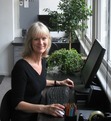Lexi Revellian's Blog, page 20
September 20, 2011
Sunset or sunrise on the Indie Summer?
 Stephen Leather, 19th September 2011, UK Amazon Forum:
Stephen Leather, 19th September 2011, UK Amazon Forum:"I think a lot of 'Indie' writers are going to find the times ahead quite difficult. Most don't really understand how publishing works and have had their hopes and ambitions raised by the sudden interest in eBooks which started late last year. But the simple fact of publishing remains the same - very very few writers make a living from their writing. It has always been that way and just because companies like Amazon make it easy for anyone to publish their work doesn't change that fact.
A lot of Indies thought that because they were selling lots of books at the start of this year that they now had a guaranteed income stream and that they would be earning money for ever more. That's not how publishing works. It doesn't work that way with paperbacks and people are starting to realise that it doesn't work that way with eBooks either. Most of the books that were in the Top 10 at the start of the year are now selling just a few copies a day. Writers who were heading the bestseller lists in the spring are now lucky if they have a book in the Top 100. And by next year most will have dropped out of the Top 1000. Books come, and they go. So do writers. It has always been a precarious way of earning a living and that hasn't changed!
What we have seen over the past year isn't so much a revolution as a bubble. The bubble isn't going to pop, but it is now deflating slowly and will continue to do so, and my prediction is that once everything has settled the eBook bestseller lists will be dominated by the same names that top the print lists. Just my humble opinion...."
Mark Williams, 11th September 2011:
"Fully one third of the top 500 ebooks on Amazon are indie-published. That means that the trad publishers, with all their money, their professional resources and their years of expertise, their huge marketing budgets and their acclaimed ability to know what readers want to read, combined with long-published names that have loyal followings built up over decades, can only manage to hold 66% of the market.
Indie publishers, on their own, often complete beginners, unknown names with no following, no resources and a shoestring budget, are mopping up 33% of the ebook market. And that can only get bigger.
How on Earth can totally inexperienced indie authors, most with day-jobs, just come along and outsell the experts? Here's why: The success of the indie e-publisher is based on their ability to be flexible; to price low; to offer quick turnaround; and to engage directly with readers and deliver what the readers actually want to read, not what the gatekeepers think readers should be reading."
So who is right?
Speaking from my own experience, just when I expected to sell more - the two month Amazon Summer Sale is over, and I've published two new books - my sales have slowed dramatically. I am not alone; it seems to be happening to most other indie writers. See this thread here on Kindleboards. The consensus is that Amazon has tweaked its algorithms twice this year, back in spring and about a week ago, each change incidentally making it a less favourable marketplace for the self-published, and better for the big publishers.
Publishing is still in a state of turmoil, though, and the fat lady sings on. Pottermore, due to launch next month, will be a game changer. Agents and publishers feel beleaguered, and with good reason. Indies have got a taste of freedom and success, and will never again feel quite so abject towards the publishing industry.
For me, the last year has enabled me to prove there is a readership for my writing, and cock a snook (whatever that may be) at all the agents who rejected my novels. I've sold over 44,000 books, and made quite a bit of money. Even if it is all downhill from now on, I'll be eternally grateful for the opportunities Amazon gave me.
September 16, 2011
I've published my first two fantasy novels...
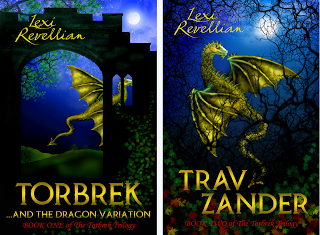 I finally decided to publish for Kindle the first two novels I wrote, Torbrek...and the Dragon Variation and Trav Zander.
I finally decided to publish for Kindle the first two novels I wrote, Torbrek...and the Dragon Variation and Trav Zander. I hesitated because they are such a different genre from Remix and Replica . Difficult to pin down what they are precisely - in fact, the way I generally describe them is fantasy for readers who don't usually like fantasy. For one thing, the characters talk like normal people instead of in that stiff archaic way so common in fantasy fiction. The setting is medieval with dragons, but no magic or elves. Especially not elves. They are suitable for any age reader from young adult upwards.
One of my favourite comments came from Steven Cudahy: "I love the characters. You seem to have managed to create a set of people halfway between Lord Of The Rings and Monty Python's Holy Grail."
I'm looking forward to seeing what the new gatekeepers, readers, think of them.
Torbrek...and the Dragon Variation UK 99p, US $0.99
Trav Zander UK 99p, US $0.99
September 8, 2011
Just Fiction Edition scam
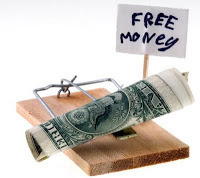 Today I got this email:
Today I got this email:Dear Ms Revellian,
I am writing on behalf of a new international publishing house, JustFiction! Edition.
In the course of a web-research I came across a reference of your manuscript TRAV ZANDER and it has caught my attention.
We are a publisher recognized worldwide, whose aim it is to help talented but international yet unknown authors to publish their manuscripts supported by our experience of publishing and to make their writing available to a wider audience.
JustFiction! Edition would be especially interested in publishing your manuscript as an e-book and in the form of a printed book and all this at no cost to you, of course.
If you are interested in a co-operation I would be glad to send you an e-mail with further information in an attachment.
I look forward to hearing from you.
Kind regards
Evelyn Davis
Acquisition Editor
Lots of writers have received similar emails recently. Go to Just Fiction's website and it's curiously vague about the details of what is on offer should you sign up with them. Check out Writer Beware and you will find it most likely appropriates your rights forever and pays you 10% royalty - extremely stingy for ebooks, even by publishing standards.
It's a sad fact these days that if a publisher expresses interest in your novel off his own bat, it is almost certainly a scam. Don't be flattered, do be suspicious. You can do better than this on your own.
September 4, 2011
Revenge of the Rejected
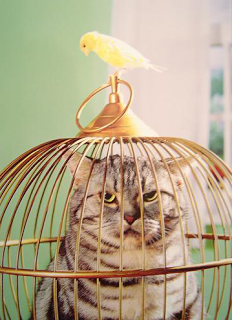 Anyone who has tried to get a publishing deal knows it's currently harder than ever. If you succeed, the advance is likely to be small and the contract all-inclusive ( just in case something unforeseen like holograms or brain implants become the dominant format some time in the future.) I've speculated before that all this rejected talent may come back to bite the publishing industry on the bottom, and with so many indie books in the Kindle charts, I think there is now evidence this is happening.
Anyone who has tried to get a publishing deal knows it's currently harder than ever. If you succeed, the advance is likely to be small and the contract all-inclusive ( just in case something unforeseen like holograms or brain implants become the dominant format some time in the future.) I've speculated before that all this rejected talent may come back to bite the publishing industry on the bottom, and with so many indie books in the Kindle charts, I think there is now evidence this is happening.It's easy to say when JK Rowling chose to e-publish Harry Potter herself via Pottermore that with her money and clout, she can do what the rest of us can't. But there's more. Mostly in America, publishers have picked up the best-selling indies - at a price. (If they'd had the wit to sign Amanda Hocking when she was submitting the year before, they'd have got her for much less than the two million dollars they paid.) Barry Eisler turned down half a million dollars from St Martins to stay indie. John Locke, a prolific and successful indie writer, has just signed a deal with Simon & Schuster. But it's a pretty unusual deal - it's just for print books. He retains ebook rights.
No eager publisher has contacted me. But in the unlikely event of this happening, would I be interested? I'd love a print-only deal that would get my novels into the bookshops, and handle foreign and film rights for me. This is improbable, though; I imagine they'd want full control, with a modest advance of five or ten thousand - and I've earned more than that on my own in one year of self-publishing. Add the loss of control, a delay of eighteen months before publication, and paper book sales dropping all the time as digital rise, and I'd feel a distinct lack of enthusiasm.
Bob Mayer, a New York Times best selling author, has been approached three times in the past month by trad authors asking him how ebooks work. He says, "Frankly, I don't think anyone in NY Publishing really understands the big picture of ebook publishing from writer to reader." I'm not sure they get the small picture, either. Inexcusably, some formatting is carelessly done. I often notice blurbs on Amazon for mainstream published ebooks with duplications, stray bits of HTML, or missing punctuation. Sometimes the author's page is left blank. When I told an author friend I'd noticed mistakes in his blurb, he said that was the responsibility of the marketing department, and it was difficult to get them to change things.
So: we have good books the public wants to read being rejected by publishers. Midlist authors are treated badly by their publishers. Bookshops are struggling, closing or changing hands. A growing indie movement has proved astonishingly successful over the last year. Writers and readers have more choice and opportunity.
Vive la révolution!
August 30, 2011
Decoding a novel
 It's easy to forget just how remarkable books are; black symbols on white paper or screen create images and concepts in our mind which can make us laugh or weep. The strange process of reading, once it has been acquired in childhood, is forgotten and taken for granted. This is a miracle that enables a truly good book to transport us to another world and consciousness in a totally absorbing way.
It's easy to forget just how remarkable books are; black symbols on white paper or screen create images and concepts in our mind which can make us laugh or weep. The strange process of reading, once it has been acquired in childhood, is forgotten and taken for granted. This is a miracle that enables a truly good book to transport us to another world and consciousness in a totally absorbing way.A reader reviewing Remix said, "... as I was reading it, it played through like a film in my mind. Very rarely a novel appears like a film to me and it's a sure fire sign that I'm enjoying it."
When I write a scene, I observe it as if it were a film; so the film playing in my mind was transcribed, published, sent to her Kindle, then replayed as a film for her. Interesting to speculate on the differences between our respective films; Caz's workshop imagined by her will not be the same as my image of it, as it's based on places she has never been to - but if I've done my job well it'll be none the worse for that. (I wonder what her Ric Kealey looks like? Drop dead gorgeous, of course...)
Thinking about this, it occurs to me that books are written in code, and only the right reader is able to correctly decode them. It is a joy for a writer when a reader totally 'gets' her novel, and of course, not everyone will, even with the most popular authors. Myself, I reckon my decoding of Jane Austen or Mary Renault is in the high nineties, percentage-wise, but for Dan Brown, DH Lawrence or Dostoevsky it's down in the low thirties.
August 24, 2011
Doomed, we're all doomed!
 It's been a week for prognostications of doom about the future of publishing, with Ewan Morrison writing at inordinate length about how grim everything is in The Guardian, and Graham Swift maintaining the rise of digital books could even mean authors would stop writing (yeah, right). I wondered whether the invention of the printing press had met with similar reactions, and pootled round Google to find out.
It's been a week for prognostications of doom about the future of publishing, with Ewan Morrison writing at inordinate length about how grim everything is in The Guardian, and Graham Swift maintaining the rise of digital books could even mean authors would stop writing (yeah, right). I wondered whether the invention of the printing press had met with similar reactions, and pootled round Google to find out. I got a bit waylaid...
Apparently, the Black Death was the catalyst that speeded transition from hand-copied manuscripts on vellum to printed books on paper. Many monks closeted in crowded monasteries fell victim to the plague, leaving fewer scribes; the price of manuscripts, already hugely expensive, went up. A vastly reduced population became better-off as they inherited from those who had died. They bought new clothes the way you would, thus making lots of rags available for the production of paper; the cost of paper books went down.
Printers now decided what to print, rather than the Church. It made sense to print the books readers wanted. They realized that the real market was not for big heavy volumes of the Bible and religious tracts, but for smaller and cheaper books on a wide range of subjects. The Church was no longer in charge of the dissemination of knowledge, because it could no longer control what people read. It got rather cross about this, but there was nothing it could do to halt the rise of the new technology beyond issuing dire warnings to an unheeding public.
Does any of this sound vaguely familiar?
August 16, 2011
Writing the next novel...
 Jonathan Morris said about writing a screenplay, There are three stages of writing a script: being unable to start it, being stuck in the middle, and being unable to finish it. Just like novels, then. It's a wonder so many get written.
Jonathan Morris said about writing a screenplay, There are three stages of writing a script: being unable to start it, being stuck in the middle, and being unable to finish it. Just like novels, then. It's a wonder so many get written.One of my favourite quotes is Lynne Truss's, concerning well-meaning friends who enquire how you are getting on with your book. "It was peculiar," they say to one another, when I pop out of the room. "All I said was, 'How's the novel?' and look, she bit my hand." I know from personal experience this also applies to silversmithing, and no doubt all other fields of creative endeavour. Stick to asking where your friend is going on holiday is my advice.
How terrible life must have been for Harper Lee after she had written her one and only hugely successful novel. To Kill a Mockingbird is a hard act to follow. She worked on another book, called The Long Goodbye, but eventually put it away unfinished. During her long life, how many kindly people have asked her what she is writing now? Ditto Margaret Mitchell, after Gone With the Wind won a Pulitzer Prize.
And I bet JK Rowling, in spite of all her riches and success, is currently fretting about her next novel, or lack of such. Just don't ask her when it'll be out.
August 9, 2011
My first year of Kindle self-publishing
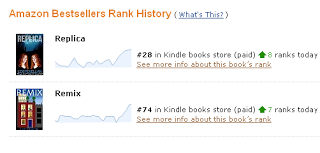 Exactly a year ago today I published Remix on Amazon for the Kindle. I didn't blog about it, because I wasn't expecting much. If I could magically whisk back in time and tell my younger self she would sell over 40,000 e-copies of her books by the same time next year, she'd be astonished. And so is the older me, except I've had time to get used to it.
Exactly a year ago today I published Remix on Amazon for the Kindle. I didn't blog about it, because I wasn't expecting much. If I could magically whisk back in time and tell my younger self she would sell over 40,000 e-copies of her books by the same time next year, she'd be astonished. And so is the older me, except I've had time to get used to it.August 2010 I sold 3 copies of Remix on Amazon. Near the end of September, I lowered the price, and sold 78 that month. In October, it was 700, and Remix went into the UK Kindle top 100. That Christmas, the Kindle turned up in lots of UK Christmas stockings. Sales exploded. In January I sold 5,939.
Many factors affect sales, and most of them you can't control. As you sell more, Amazon makes your book more visible - but the opposite happens if your sales falter. As Remix sales dipped towards the end of March for a variety of reasons, Replica was out with beta readers and I was designing its cover. Replica was published 9th April 2011, and Remix fans sent it straight into the top 100. In May my sales were 7,196. Remix has spent over eight months in the top 100.
Like many writers, I dreamed of mainstream publication, and spent a year submitting Remix. But as someone who has always been self-employed, and as a single mother, I'm used to doing everything myself. I've enjoyed learning how to do covers and formatting, and writing a blurb is much easier than writing a synopsis.
Publishing is changing so fast, who knows what is round the corner? Is this a brief golden age for indies, an opportunity that will vanish as the industry gets its act together? Maybe. But it's really nice while we've got it.
Grateful thanks to Amazon, and especially to all my readers.
August 6, 2011
Book promotion or nagging?
 Anyone who's brought up a child knows that nagging doesn't work (not sure what does work with a teenager, but that's a subject for another blog). So there is simply NO POINT adding a sombre, "Please enjoy responsibly," to a radio advert for alcohol. That is so not going to make the listener think, "Dear me, in that case I'd better not go out with my mates and get ratted tonight as planned." Similarly I doubt all the messages on cigarette packets persuade smokers to desist. The thing about nagging is that it's irritating, so people tune it out.
Anyone who's brought up a child knows that nagging doesn't work (not sure what does work with a teenager, but that's a subject for another blog). So there is simply NO POINT adding a sombre, "Please enjoy responsibly," to a radio advert for alcohol. That is so not going to make the listener think, "Dear me, in that case I'd better not go out with my mates and get ratted tonight as planned." Similarly I doubt all the messages on cigarette packets persuade smokers to desist. The thing about nagging is that it's irritating, so people tune it out. Indie authors, who have to market their own books, sometimes forget this. Every now and then, you come across a post like this:
Hi everyone, my thriller The Tattooist is on special offer for 99p!
What starts as just another murder investigation for DI Beverly Richards gradually turns into a nightmare, as a ruthless serial killer known as The Tattooist slays and mutilates lots of attractive young women and a few children and pets too, then tattoos clues on to their skins to taunt the police.
In a unique twist, the killer begins to hunt the cop hunting him! Beverley must find him and stop the slayings before he slaughters her, her twins, and her pet lop-eared rabbit, while simultaneously dealing with a hard-drinking boss who wants her taken off the case. Not to mention unfinished business with a man from her past who may not be what he seems.
Time is running out for Beverley – can she beat her demons and survive a final show-down with The Tattooist?
Happy reading!
Perhaps they worked, in the early days of the Kindle; but now, I think there have been so many posts like this, often inappropriately posted on half a dozen threads simultaneously, that potential readers mostly screen them out. On the US Amazon forums, such was the proliferation of Buy my book! posts that Amazon has declared zero tolerance, banning even discreet book links in signatures.
Writers need readers, and won't get them by badgering.
July 30, 2011
Writing and self-discovery, by John Harding
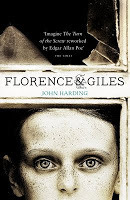 Today I'm pleased to have a guest post by John Harding, a mainstream author with four published books.
Today I'm pleased to have a guest post by John Harding, a mainstream author with four published books. His first novel, What We Did On Our Holiday , was short-listed for the W H Smith New Talent award and became a bestseller. It was made into a two-hour TV film by Granada in 2006. His latest is Florence and Giles (only 99p for Kindle) which I thoroughly enjoyed, though as a gothic literary thriller, it's a bit outside my comfort zone. The story is gripping, but what made it for me is the twelve year old narrator Florence's idiosyncratic use of language. I was very taken with Florence.
I suggested John write something about the writing process, and this is what he wrote:
I DIDN'T KNOW I KNEW THAT
by John Harding
The American novelist Wally Lamb once wrote: 'I write to discover what I didn't know I knew.' I find it's a phrase that resonates and by way of illustration, let me tell you a story about me.
In my novel Florence and Giles, for reasons I won't go into here, Florence, the 12-year-old narrator, has never been allowed to learn to read. But one day she discovers the neglected library of the decaying old mansion where she lives, an immense dusty, disregarded room crammed with books. Visiting it in secret, she teaches herself to read, and then proceeds to work her way through the books there. It's a forbidden, clandestine act, and Florence has to take many precautions to avoid being caught. If she is, she'll be banned from the room and have no more books again. So she's always extremely careful to leave the books exactly as she found them.
Now, when I'd finished it, one of the things I liked about Florence and Giles was that my previous three novels had all contained clear elements of autobiography. For the first time I'd written a book that had nothing to do with my life. Everything in it was completely made up. Or so I thought.
After the book came out I was giving a talk about it one day and someone asked a question – I can't even recall what it was now – and suddenly I found myself replaying an episode from my childhood. It wasn't just something I hadn't thought about for nearly years; it was something I'd completely forgotten.
I grew up in a house with only four books in it on a council estate in a bleak and remote Fenland village where culture simply didn't exist. It's likely I'd never have become a prolific reader, let alone a writer, but for one thing. I had my early education in the village primary school (roll call 90 kids) and my mother was the school caretaker. Or, take away the fancy title, the cleaner. Every day when school finished at three o'clock and the teachers and the other kids all left, I stayed behind and my mother arrived and got to work. Last thing every day, before they went home, every pupil had to put his chair on his desk. First thing my mother did was to sweep the floors and when she'd done that (it didn't take long; she was a fast worker and she had a lot to do) it was my job to stand all the chairs down again so she could clean the desks. Once I'd done that I was free.
The school had three classrooms, for kids aged 5 to 7, 7 to 9, and 9 to 11. Each classroom had its own teacher who taught two different year groups within that class. Now, at first, when I started school at five years old, there wasn't a whole lot to do after school once I'd finished with the chairs, but pretty soon I learned to read and once I did, I was off. It didn't take me long to work my way through all the books in my own classroom, the infants. They mainly concerned two kids called Janet and John whose idea of a good time was to point at every day objects or animals and say something like 'See a dog' or 'See a chair'. Once I'd mastered all of these in my after school sessions, I started on those in the next classroom up. There was a frisson of excitement about this, because I never entered it during school time. In most ways it wasn't any different from the infants except it didn't have the Wendy house or the portable sandpit on wheels. The principal difference was, the books. Suddenly I was transported into a magical place. I remember clearly a whole series of little books with horizontally red-and-white striped covers and large print. Each one contained an ancient Greek or Norse myth. I especially loved the ones about Loki the Norse god of mischief who caused havoc in Valhalla just for the hell of it. My most spectacular find was Tintin. There were two of them: King Ottaker's Sceptre and The Crab With the Golden Claws. Of course, I knew comics, no child of the fifties didn't, but this was something else. A proper hardback book consisting of just one story, in the most beautiful colours. I would have given anything to own one of them. It was another ten years before I did.
Anyway, I read my way through everything in 7-9 long before I was officially allowed to enter that room, and after that I went at the ones in 9-11 and by the time I was nine I was relying on new books arriving or rereading stuff I'd already read, because I'd already read every book in the school. Right from the start my mother had told me, 'Mr Teale (he was the head teacher) might not like you touching those books, so don't say anything to anyone about it. And make sure you put them back exactly where you find them.' Looking back on it, my mother's attitude seems tantamount to paranoia. Surely the headmaster would have been delighted to find a child so keen to read? But I never thought to question it. I supposed she was worried about stepping out of line in any way in case she lost her job. Of course, as I imagined Florence doing so many years later, I always left the neighbour book slightly poking out when I took a book from a shelf so I'd know its place, though actually I'm pretty sure now none of the teachers would have noticed. It doesn't matter, because my mother's insecurity gave me a great gift. It made reading an exciting, forbidden thing; books have never lost that lustre for me.
Now this whole business was lost to me for many years until I wrote Florence and Giles when it surprised me by surfacing again. I'd filed it away some place and not only forgotten where but that the file existed at all. This is what writing does, which brings us back to Wally Lamb. Of course what he was talking about, wasn't just recovered memories, like mine here. He meant the emotions we don't know we feel, the attitudes we don't know we have, the connections we never make until they surface from our unconscious onto the page in that gloriously surprising process that writing is. The connection between my childhood experience and Florence's fictional one was an emotional one; I was reconnecting with the fear, the excitement, the sheer guilty pleasure I'd felt nearly half a century before.
John Harding: Website
Twitter: @JohnRHarding
Florence and Giles: Amazon UK
Florence and Giles: Amazon US

